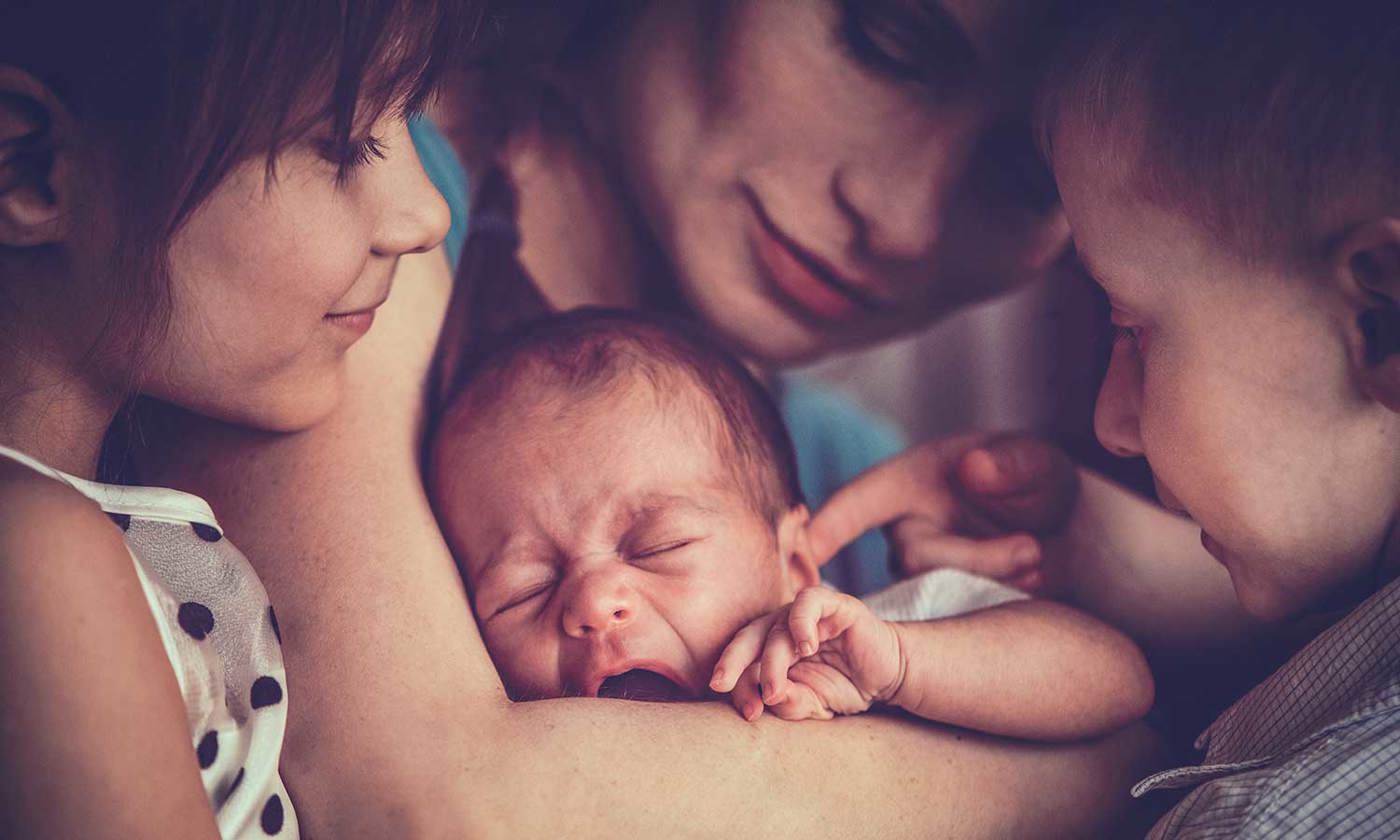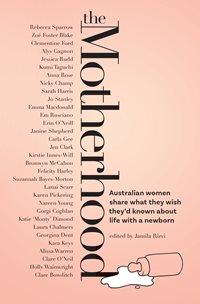Like what you see?
Sign up to receive more free parenting advice.
Thank you for subscribing to our newsletter!
Lifestyle

Credit: iStock.com/ArtMarie
Looking back at her transition to motherhood, Jamila Rizvi says she laughs at the absurdity of how unprepared she was for how much her life would change.
 “The hardest part was that the life I entered was so completely different to anything that I had lived before, that I really lost my sense of self,” Jamila says.
“The hardest part was that the life I entered was so completely different to anything that I had lived before, that I really lost my sense of self,” Jamila says.
“I had always defined myself by my work and now suddenly not having that for the first time I just didn’t feel I had a grip on who I was supposed to be in the world.”
Jamila Rizvi is an author, presenter and commentator. Previously she worked as an adviser in the Rudd and Gillard governments and has been named one of Australia’s 100 Most Influential Women by The Australian Financial Review.
In her new book The Motherhood, Jamila captures 32 raw, compassionate and funny letters from Australian mothers - written to themselves - about their first few months with their newborns. The letters talk honestly about new motherhood sharing the joys, frustrations, loneliness and laughter.
It’s full of overwhelming love and joy, coupled with extreme sleep deprivation, shock and anxiety. It is possible to be blissfully happy one minute and desperately sad the next. But we worry if we speak honestly and express the negatives that people will think that we don’t love our children and the complexity of adapting to new motherhood is made all the more difficult because of the vast amount of judgement that exists.Jamila Rizvi
The Motherhood offers a window into the crushing reality of sleep-deprivation and the incredible highs of loving a new human.
Paying it Forward
Jamila says the catalyst for the book was a visit from friend (and Australian musician, actor, radio presenter, and business entrepreneur) Clare Bowditch, not long after the birth of her son Rafi in 2015.
She went from working in a busy office connected to her staff and team, to feeling isolated at home with a newborn.
“There’s a point around 2 to 3 in the morning when you’re up breastfeeding in a dark room when you genuinely feel like you are the only people in the world. For some people that can feel very loving and special, and for others it can be isolating as it was for me,” Jamila recalls.
“One day Clare rocked around with her kids and helped me clean up and had a cuddle and headed off. After heading off she sent me a text message. It was so long, it was one that went over two pages. It was like an essay.
“She reassured me about so much of what I was feeling. That what I was feeling was normal and valid, that it was okay to be upset and scared and that didn’t mean that I loved my baby any less and I was going to be any less of a good mother.
“She really told me what I needed to hear in that moment and gave me some confidence that I was doing okay and that I would find that happy contented life again.
“There is something particularly powerful about letters. I think they are so incredibly intimate. You can refer back to them - not like a telephone conversation that is gone in an instant. You can return to them for reassurance.
“I decided that I wanted to pay that forward and talk about my own experience to help new mothers. I was very aware their experiences vary greatly, but that my experience would be useful to some women, but not others.”
The diversity of experiences
 Jamila says it’s important that women share their stories as their experiences are so vastly different.
Jamila says it’s important that women share their stories as their experiences are so vastly different.
Reaching out to women she knew and others that she admired and believed had interesting stories to tell, Jamila says she was overwhelmed by how many people said yes.
She says her request tapped into a genuine desire to pay it forward when it comes to new motherhood.
“I asked 32 women to contribute to this book so I could put together a range of experiences.
“I wanted the book to be diverse. It was quite deliberate that the book was as inclusive as possible. I wanted to make sure everyone felt respected and their experience was represented.”
The book contains stories of multiple births, caesarean sections, those who breastfed and those who didn’t, culturally diverse experiences, mothers and children with disabilities, nuclear families, single parent families and same sex families.
In the book, Kirstie Innes-Will and partner Jen Clark describe their journey through egg donation to another couple and then their own IVF experience from the remaining embryos. Both tell their stories separately, from the perspective of Jen as birth mother and Kirstie fielding questions at the hospital trying to explain she is Jen’s partner, the baby’s mother, and “not just some random”.
Katie ‘Monty’ Dimond presents a warts-and-all on breastfeeding and the horror of mastitis. Describing formula as “grouse” she assures herself she is not letting anyone down if breastfeeding becomes too hard and painful.
Lanai Scarr gave birth to triplets – two identical boys and a girl in an emergency C-section taking her family from three to six in an instant.
Kumi Taguchi gave birth away from home in Hong Kong, isolated from family and friends and disconnected by language and culture.
Jamila says historically woman haven’t spoken openly about pregnancy and birth because the reality is that motherhood is full of contradictions.
“It’s full of overwhelming love and joy, coupled with extreme sleep deprivation, shock and anxiety. It is possible to be blissfully happy one minute and desperately sad the next.
“But we worry if we speak honestly and express the negatives that people will think that we don’t love our children and the complexity of adapting to new motherhood is made all the more difficult because of the vast amount of judgement that exists.”
Within the media so much of the picture of a mother is an unattainable perception. If you don’t have other mothers in your life who can help show you that is not just impossible but absurd, I think you’d end up feeling like you’re failing every day.Jamila Rizvi
The importance of friendships
However, the book reinforces that friendships play an important role in ensuring woman ground themselves in reality about motherhood.
Jamila says she always claimed before becoming a mother, that she would never abandon her friends who didn’t have children, to only socialise with other mothers.
She did however discover the importance of developing a network of other mothers.
“Within the media so much of the picture of a mother is an unattainable perception. If you don’t have other mothers in your life who can help show you that is not just impossible but absurd, I think you’d end up feeling like you’re failing every day.
“Having people who will listen to your fear and anxiety is really valuable. Sometimes you don’t need advice. New parents get a lot of advice. Sometimes you just want someone to listen and understand and make you feel heard.
“A lot of women I spoke to said how important it was for them to tell their birth story not because they wanted everyone to know, but because that was how they process what just happened to them.”
The turning points
Since the first few challenging months after bringing Rafi home, life has evolved for Jamila who has found her feet in motherhood.
“The difficulty for me was in those first few months, parenting was so uneven just by the nature of having to breastfeed and a newborn preferring the parent they’ve lived inside for nine months.
“Once I got past the six months mark and I was feeding slightly less and he was eating slightly more from other sources, my husband was able to share the parenting.
“We have been very deliberate in trying to make sure as parents it is as even as possible. Once parenting became a genuinely shared partnership I could start to enjoy it a lot more.”
The second turning point for Jamila was when Rafi started talking.
“For someone who enjoys the company of little children I enjoy having conversations with toddlers and their funny little phrases. I love the ridiculousness of a toddler conversation.
“One of the things perhaps we miss when we are talking to new parents, we tell them about the overwhelming love and we tell them how tough it’s going to be, but we forget to tell them how much fun it is. We have got to tell them how much fun this is.
“I spend time with my husband and laugh, but I laugh spending time with my husband more than I ever did since I had my son.”
Jamila urges parents to “embrace the silliness”.
“The capability for a 2 to 3-year-old to be completely absurd is boundless. We lose that as adults and it’s wonderfully nice to give into it again.”
Book advance for The Motherhood donated to CARE Australia
Jamila is a CARE Australia Ambassador. CARE Australia is an Australian charity and international humanitarian aid organisation fighting global poverty, with a special focus on empowering women and girls to bring lasting change to their communities.
She donated her book advance for The Motherhood to CARE Australia and she says many of the contributors also refused to be paid for their writing.
“While the struggles in the book are real and valid challenges that mothers face, life in the developing world is a struggle for life itself.
“This donation will help CARE continue their important work.”



